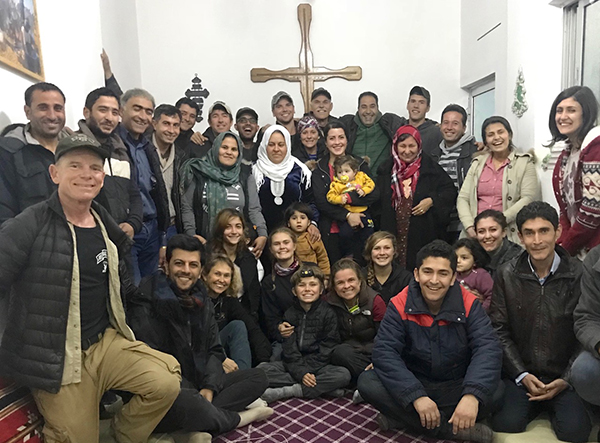Life and Faith in the Face of New Attacks: A Playground and Church in Kobani, Syria
21 February 2018
Kobani, Syria

Syria is in its seventh year of civil war and now the Turkish military has launched an offensive into the Kurdish enclave of Afrin in northwest Syria while pro-Syria regime forces have attacked Kurds in eastern Syria this week. The Kurds have been the most effective force against ISIS in Syria and have US support but the Syrian regime of Assad views them as a threat to their power and Turkey sees them as a threat as well. Turkey has a large Kurdish population of over 20,000,000 and an ongoing Kurd insurgency inside Turkey. Turkey views the Kurds in Syria as part of this insurgency and want to make sure the Kurds in Turkey get no support from the Syrian Kurds. On January 20, 2018, the Turkish Army along with elements of the Free Syrian Army (FSA), who in this area are composed of reportedly radical Muslim groups and some remnants of ISIS, launched an air and ground campaign against the town and area of Afrin, one of the only peaceful areas of Syria. The Kurds have kept ISIS at bay all through the war and Afrin had become a refuge for thousands of fleeing Kurds and Arabs of different groups and faiths. Now over 100 people have been killed by the joint Turkish-FSA attacks and Turkey has increased its airstrikes. At the same time, pro-Assad forces have attacked the Kurds in the Deir Ez-Zor area of eastern Syria. This attack has been stopped by the Kurds with US air support. In the midst of these new attacks and offensives, the Kurds are rebuilding towns like Kobani, which has been ravaged by both Assad and ISIS.
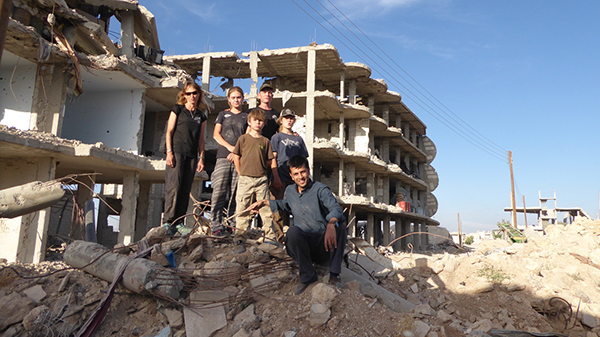
Kobani rises from the plains on the Syria/Turkish border, a gray-brown city that blends into the dusty winter landscape. Most buildings are brown adobe or gray cinderblock. Evidence of construction is everywhere as the people rebuild following successive destructive wars – first suffering under the bombs of Assad in 2012 and then the invasion of ISIS and fight to oust them in 2014. Adding to the pain, the Turkish government put a wall up in 2016 blocking access to Kobani from the north. One street remains untouched: gutted buildings with interiors gaping, twisted rebar and piles of rubble that used to be walls and ceilings – by decision of the people, these will remain as evidence of the violence wreaked on Kobani, that made it for months the headline symbol of senseless suffering. But: new life is springing up here, there is new color in the landscape.
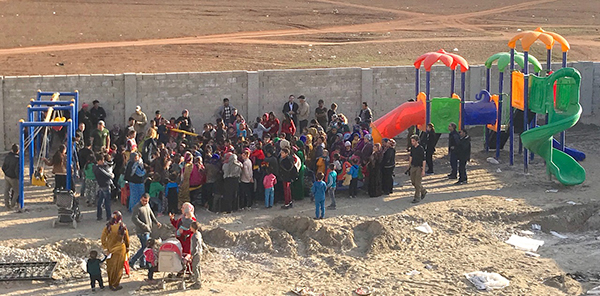
On the outskirts of town a large orphanage is under construction. This is for some 900 children who lost a parent to the war. Many of these were orphaned in the massacre of June 25th, 2015, when ISIS swept back into Kobani, after they had already been pushed out, and wantonly killed over 200 men, women and children (see our report from 16 July 2016). Standing out against the gray of the new buildings and brown of the landscape, a new, colorful playground rises beside the orphanage – this is thanks to Reload Love, part of their vision of bringing love to kids caught up in war. The playground is the brightest thing in the area – and when we invite the kids from the local neighborhood in for a Good Life Club program at the playground, they swarm over the slides, swings, merry-go-round, and see-saws. It’s frenetic play, like they want to cram in as much as possible because they don’t know how long it will last.
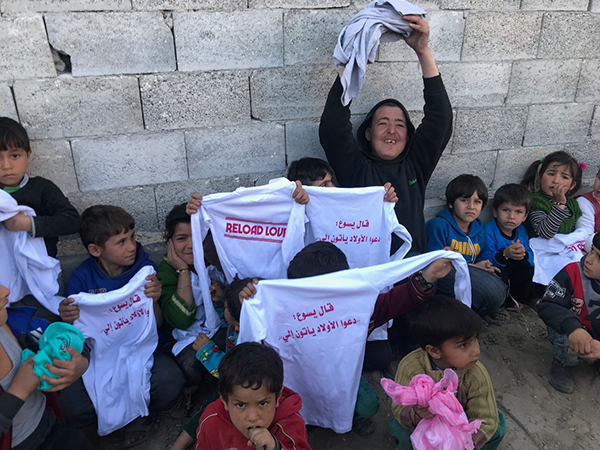
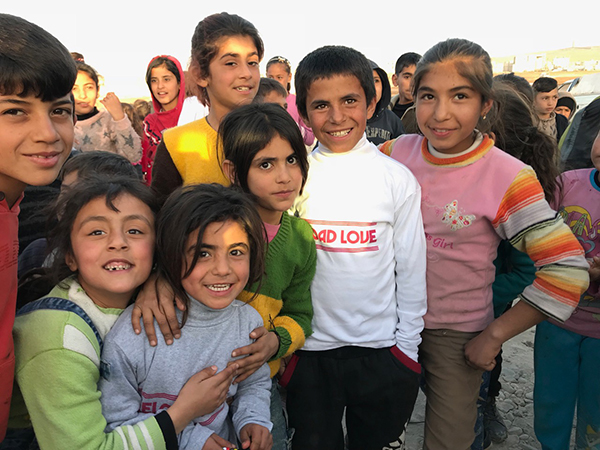
Bashir, our Syrian Christian team member, helps us gather them for a GLC program and they sing songs, learn some basic health and hygiene information and learn about God’s love through a five-colored bracelet. They laugh at our rendition of the Good Samaritan story, which Jesus told to answer the question of who and how to love. And then we release them again to swarm over the playground for a few minutes. We play with them, and there is joy, laughter, freedom, in the air as we hurtle down the slide, piling on top of each other in a heap, getting up and running around to do it again. Then the program is over and the moms who had also gathered lead their children home. Soon the orphanage will be full of more children who currently live with relatives and friends, dispersed precariously throughout the community. Before they leave we say a prayer, of thanks for this new life, new color and new hope for these children.

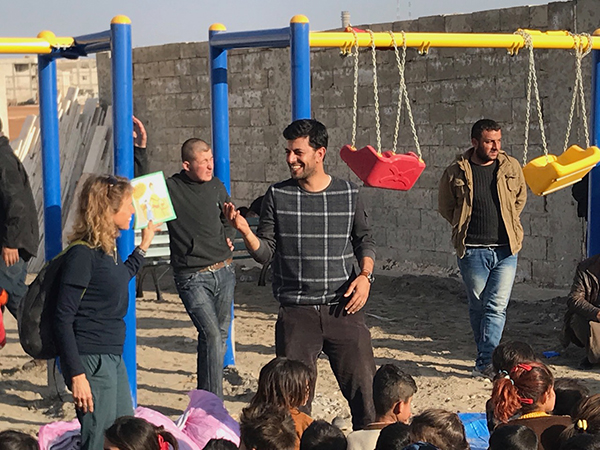
But there is more new life in Kobani, springing directly from the aftermath of ISIS’s destruction – like those seeds that need heat to burst open, the seed of the gospel has sprung up in the heat of ISIS’s hate. In this new and recovering Kobani, there are new Christians as well, representing two churches. After our GLC program, we met with members of both gatherings in a small upstairs room. One of these churches started with the revelation of Jesus in the heart of one man, around ten years ago. A Muslim, he realized praying in the mosque one day, and seeing the people at prayer, that their hearts were not touched; they were saying words but experiencing no life. This shook him and he cried out to God to show him the truth. Soon after he had a dream in which he was transported to Israel, invited into someone’s house for a meal and met a robed and hooded figure who touched him with a sword, once on each shoulder and then his head. As he looked up at the figure, half of the face was revealed – and it was shining like gold, with a penetrating and beautiful eye unlike anything he had ever seen. He knew: Jesus was revealing Himself. This man became a believer, but without a church or other Christians, only in his own heart.
That is, until ISIS came.
Then he, along with many from Kobani, fled to Turkey. In the refugee camps there, believers found each other and other Christians came to bring aid and encouragement. People’s faith grew, churches formed – and now they have returned to Kobani. One group meets in the upstairs of that man’s house. The other has its own building and this where we met them. Several crosses are the only decorations on the white walls of the room where we all sit on mats on the floor. We share a little bit and then the singing begins. One of the men has a traditional Kurdish guitar and they sing a prayer accompanied by guitar and drum. Then a young woman in the group grabs a guitar and sings a duet with the girl sitting next to her, a worship song in Kurdish. Then they sing another. And another. Sahale and Suuzanne sing an English worship song. And we all sing “Shout to the Lord” together, in Kurdish and English. We close our time with prayer – and they invite us to stay the night in their church. It’s a welcome warm shelter, with hot water and a kitchen. As we settle in, we are gifted with another vivid splash of color to cap our day in Kobani: they bring in overflowing platters of fruit – apples, bananas, kiwis, oranges.
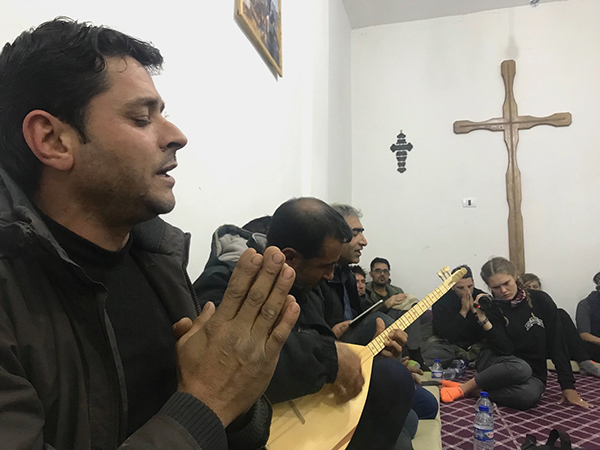
The next morning they arrive early and serve us breakfast. We leave them with prayer, supplies of Christian material and some financial help. We take away hearts full of gratitude, hope and renewed faith in God’s redemptive, resurrection power. Kobani, once an international symbol of the evil and darkness mankind is willing to wreak on itself, is rising again, and this time with a small light glowing at its heart.
Thanks for helping us be here, God bless you,
Dave, family, team, and Bashir in Syria
